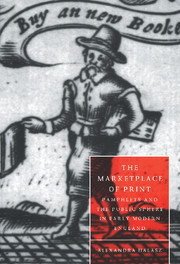1 - Print matters
Published online by Cambridge University Press: 10 December 2009
Summary
“To ask ‘What is a pamphlet?’ is rather like asking ‘What is a dog?’,” writes George Orwell in an essay introducing a two-volume collection of British pamphlets written between the sixteenth and twentieth centuries. “We all know a dog when we see one, or at least we think we do, but it is not easy to give a clear verbal definition, nor even to distinguish at sight between a dog and some kindred creature such as a wolf or a jackal.” The genus Orwell selects – canis – is not without significance, for he wants to privilege the pamphlet as a special polemical literary form, as writing with a bite. In setting out species alternatives, however, he raises rather than answers questions about pamphlets' status. Is the pamphlet, like the dog, a domesticated creature, capable of performing directed tasks, or is it, like the wolf, fierce, wild, and not susceptible to control? Or, is it a jackal, a servile carrion feeder moving in on others' leftovers? Seeking to define “the true pamphlet” so that its prestige can be restored in the tradition of Milton, Swift, Defoe, and Paine, no sooner has Orwell begun than his metaphor reveals a problem of breeding: born of a bitch, the pamphlet always runs the risk of being seen as a bastard, or of being a crossbreed.
Orwell's effort to assign pamphlets specific discursive qualities undoes itself, for “pamphlet” does not describe content or even genre. It names a format, a small book that, from a commercial perspective, can be produced quickly, transported easily, sold inexpensively, and yet can contain a variety of discourses. The press that actually breeds pamphlets is a shadowy figure in Orwell's essay, taken for granted as the machine of production.
- Type
- Chapter
- Information
- The Marketplace of PrintPamphlets and the Public Sphere in Early Modern England, pp. 14 - 45Publisher: Cambridge University PressPrint publication year: 1997



